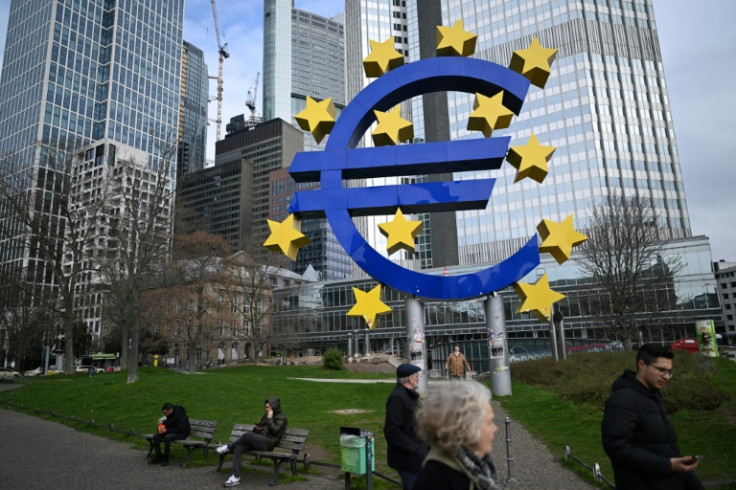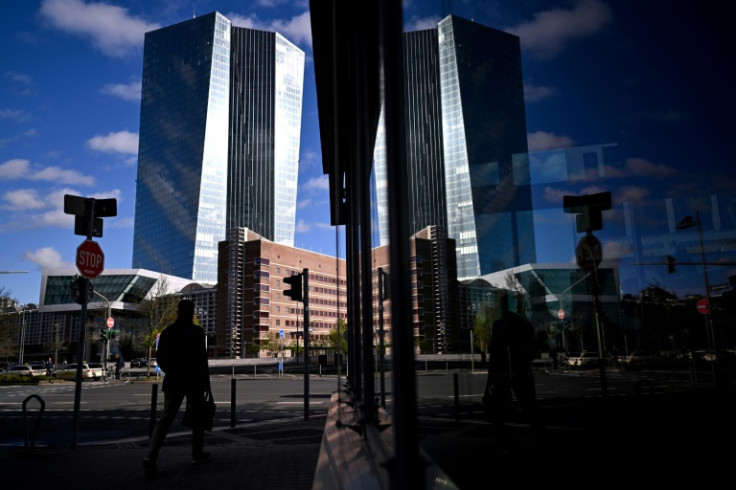ECB Seen Holding Interest Rates One Last Time

The European Central Bank is expected to freeze its key interest rate at a record high again Thursday but pave the way for a first cut in June as inflation eases.
Policymakers have kept borrowing costs on hold since October, after a historic run of hikes to bring runaway price rises under control.
But calls have been growing for cuts to begin as inflation falls rapidly and higher rates take their toll on the 20-nation single currency area.
Eurozone inflation slowed more than expected in March to 2.4 percent -- not far off the ECB's two-percent target.
A reduction Thursday is seen as unlikely with officials having repeatedly stressed they are waiting for more data that will only be available before their meeting in June.
But investors will be closely watching for indications from president Christine Lagarde that the ECB is set to shift gears in summer, and about the pace of cuts when they do start.
At this week's meeting, "the majority of (ECB governing) council members will probably vote for unchanged key interest rates", said Fritzi Koehler-Geib, chief economist at public lender KfW.
But a reduction "before the summer break is very likely, provided the data for the coming months underpins the trend back towards sustained price stability", she added.
In particular officials are keeping an eye on wage growth, which has become a key driver of inflation in recent months, as the energy shock triggered by Russia's 2022 invasion of Ukraine fades.
In June, the ECB will also have its own updated forecasts on inflation and economic growth.
After 10 consecutive hikes from mid-2022 to late last year, the ECB's benchmark deposit rate is currently at a record four percent.
Eurozone inflation, which peaked at over 10 percent in late 2022, has steadily declined in recent months and is now expected by the ECB to return to target in 2025.
But the higher borrowing costs have hit the eurozone economy hard, dampening demand as households and businesses feel the squeeze from more expensive loans and mortgages.
The eurozone only narrowly avoided a recession in the second half of 2023, weighed down by a poor performance in its largest economy, Germany.
Like other central banks, the ECB is now weighing the best time to switch gears and support economic growth through lower rates -- without endangering the progress on inflation.
The Swiss National Bank kicked off the rate-cutting cycle last month when it lowered its main rate by 0.25 percentage points -- becoming the first major central bank to do so.
The US Federal Reserve, which began hiking earlier than the ECB and has kept rates steady at recent meetings, is expected to sit tight a while longer in the face of a robust economy.
Fed chairman Jerome Powell said last week that the high benchmark rate was "doing its job" against elevated inflation, warning that lowering it too soon could be "quite disruptive" for the American economy.
The possibility of the ECB slashing rates before the Fed has worried some observers.
Lower rates in the eurozone could prompt investors to look elsewhere for higher returns, weakening the euro and making imports more expensive -- potentially reigniting inflation.
But many observers believe the Frankfurt-based institution will chart its own course, and are pencilling in three to four cuts this year, by 25 basis points or 0.25 percentage points each time.
Lagarde however has said the ECB would not "pre-commit to a particular rate path", stressing that future decisions would depend on incoming data.

© Copyright AFP {{Year}}. All rights reserved.




















